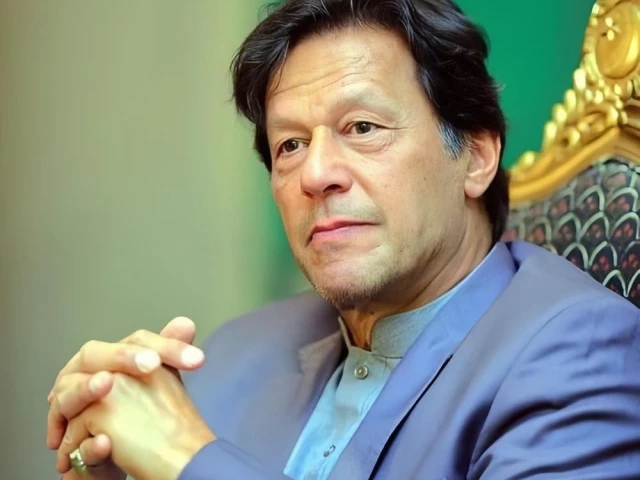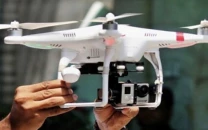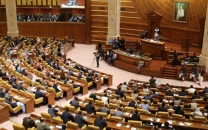Imran's fate hinges on high courts
Justice system has so far failed to adhere to due process

Though ex-prime minister Imran Khan has been convicted in five cases since August 5, 2023, none of his convictions has so far been endorsed by any high court. Likewise, serious questions are being raised on the fairness and non-adherence to due process during his trials.
Imran Khan's legal team is consistently alleging that due process and the requirements of fairness enshrined in Article 10-A of the Constitution have not been adhered to during his trials.
Though the PTI leadership has been unable to evolve any effective strategy for the release of Imran Khan during the last two years, the non-adherence to due process during his trials has raised serious doubts among the masses, which is also giving political advantages to his party.
Despite the absence of a joint symbol and the non-availability of a level playing field, the February 8 general election results were shocking for other major political parties. Until Imran is considered a political victim, his opponents cannot defeat him in a free and fair election, says a senior lawyer.
He said that the two major political parties, the PML-N and the PPP, should have realized that if they want to defeat Imran on the political ground, then the victim card should have been taken away.
First, Imran Khan was convicted in the Toshakhana case on August 5, 2023. The trial court, presided over by Additional Sessions Judge (ASJ) Humayun Dilawar, had given a three-year sentence.
However, some lawyers believe that there were serious defects in the judgment. They questioned why the trial court was in such a hurry to decide the case without recording statements of the witnesses whom Imran Khan wanted to present in his defence.
Even the trial court did not wait for his counsel, Khawaja Haris, to give his final arguments. Faisal Siddiqi, while commenting on the judgment on August 5, had expressed grave concern over the trial court's decision, viewing it as a symbolic destruction of political justice in the country.
Siddiqi also asserted that the judgment was "a result of revenge politics on the part of the PDM government and political manipulation by the deep state." He not only called for the judgment to be overturned but also urged the superior judiciary to investigate the author judge for tarnishing the entire judicial system's reputation.
Soon after the announcement of the decision, Imran Khan was arrested in Lahore.
After a couple of weeks, the Islamabad High Court led by then Chief Justice Aamer Farooq suspended the trial court decision. The main appeal in this case is still pending in the IHC.
Later, Imran was convicted in three cases wherein trials were conducted in Adiala Jail. These convictions were awarded before the general election of February 8, 2024. There are serious allegations of manipulation of trials in those matters.
Interestingly, Imran's conviction in the Cypher case has been set aside by a division bench of the IHC led by Justice Aamer Farooq. Likewise, in a second matter, the appellate court also quashed Imran and his wife Bushra Bibi's convictions in the Iddat case.
The IHC suspended their convictions in the Toshakhana case. The final appeal is still pending in this matter before the IHC. Meanwhile, the trial court conducted the jail trial of Imran and his wife in the 190 million pounds case.
Though the judge fulfilled all procedural requirements during the trial in the 190 million pounds case, questions are being raised on the maintainability of the case after the NAB law amendments. Likewise, the judge postponed the date for the announcement of judgment three times.
Despite the passage of more than five months, the IHC is yet to decide Imran and Bushra's petitions seeking suspension of the judgment in the 190 million pounds case. Imran's legal team is consistently filing early hearing applications, but the high court is yet to decide the case.
Now, two trials of Imran Khan are continuing in Adiala Jail. One is related to Toshakhana and the other to the May 9 rioting. Recently, the Lahore High Court (LHC) rejected the post-arrest bail of Imran Khan in the May 9 cases.
Subsequently, the legal team has approached the apex court against the LHC order. The matter is listed for hearing in the SC on August 12. Post-26th Amendment, as well as the transfer of judges to the IHC, Imran Khan is struggling to get relief in the superior courts.
Though the IHC passed an order conditionally allowing meetings with Imran Khan in Adiala Jail, the decision has not been implemented by jail authorities.
At present the government is in a strong position and Imran Khan is still receiving massive support, the only loser is the justice system, which has so far failed to adhere to due process and the requirements of fairness enshrined in Article 10-A of the Constitution during the last two years.
Recently, Supreme Court judge Syed Mansoor Ali Shah issued an additional note in the ex-PM Zulfiqar Ali Bhutto presidential reference case. He said judges must uphold their oaths with courage in the face of oppression, for only then can the judiciary truly safeguard democracy and the rights of the people.
"Let the lesson of transitional justice be clear transitional justice, however, often becomes necessary because, during oppressive rule, some judges fail to uphold their constitutional duty, succumbing to the pressure of illegitimate authority.
"This failure not only enables violations of due process and fair trial rights but also erodes public trust in the judiciary," wrote Justice Shah. He said the Bhutto case serves as a classic example of a political trial, illustrating how such trials can be manipulated to advance authoritarian designs.
Likewise, present CJP Yahya Afridi in a similar case said that the extraordinary political climate of the time and the pressures inherent in such an environment appear to have influenced the course of justice in a manner inconsistent with the ideals of judicial independence.
























COMMENTS (1)
Comments are moderated and generally will be posted if they are on-topic and not abusive.
For more information, please see our Comments FAQ